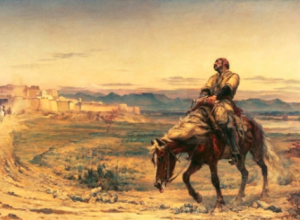
Only one soldier survived the British retreat
The history of invasions of Afghanistan is not a happy one. We know what happened to the Russians a few decades ago, and what is happening to the Americans now. But the pattern was already set by the British invasions in the 19th Century as told in the introduction to a New York Times book review of William Dalrymple,“Return of a King.”
“The story of the British invasion of Afghanistan in 1839-42 (what was later called the First Afghan War) can be briefly told. A British Army entered the country in April 1839, captured Kabul and ejected the ruler Dost Mohammad Khan. He was replaced by Shah Shuja, who had been living in exile since his overthrow by Dost Mohammad and his brother some 30 years earlier. The British expected Shah Shuja to be a more pliable king, a client of their Indian Raj, and a more reliable ally against the intrigues of the Russians. But they underestimated the resentment that their presence would arouse, and inflamed Afghan hostility by their overbearing behavior. After they failed to quell an uprising in Kabul and their envoy was murdered, they agreed to withdraw. But the retreating army of British officers, Indian soldiers and a multitude of camp followers was slaughtered almost to a man as it struggled back through the Khyber Pass in January 1842. Some months later, the British returned with an “army of retribution.” After a short stay in Kabul, and some indiscriminate killing, they withdrew once more. Dost Mohammad returned (with their blessing) to resume his place on the throne. Ever since this fiasco, an entire phalanx of writers has denounced the arrogance, folly and incompetence of the British aggressors (of which there was plenty) and has drawn a predictable lesson: those who invade Afghanistan pay a high price in treasure and blood — and also inflict one on its unlucky peoples.”
Search for Common Ground: Engagement — Not Isolation — Offers Best Hope for Afghanistan
A crucial moment for women’s rights in Afghanistan
Women Are Critical to Building a Lasting Peace in Afghanistan
IWPR Holds Landmark Afghan Peace Conference
UNHCR names Afghan refugee teacher Aqeela Asifi its 2015 Nansen Refugee Award winner